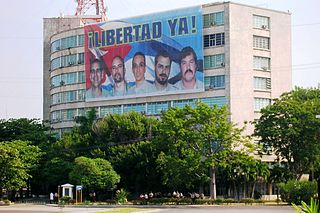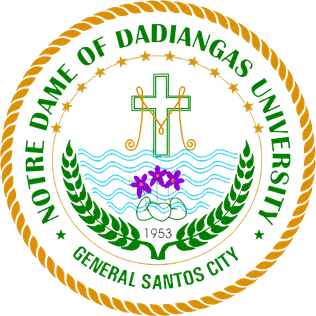
The Cuban Five, also known as the Miami Five, are five Cuban intelligence officers who were arrested in September 1998 and later convicted in Miami of conspiracy to commit espionage, conspiracy to commit murder, acting as an agent of a foreign government, and other illegal activities in the United States. The Five were in the United States to observe and infiltrate the Cuban-American groups Alpha 66, the F4 Commandos, the Cuban American National Foundation, and Brothers to the Rescue. They were part of La Red Avispa composed of at least 27 Cuban spies.

The Marist Brothers of the Schools, commonly known as simply the Marist Brothers, is an international community of Catholic religious institute of brothers. In 1817, Marcellin Champagnat, a Marist priest from France, founded the Marist Brothers with the goal of educating young people, especially those most neglected. While most of the brothers minister in school settings, others work with young people in parishes, religious retreats and spiritual accompaniment, at-risk youth settings, young adult ministry and overseas missions.
The Varela Project is a project that was started in 1998 by Oswaldo Payá of the Christian Liberation Movement (MCL) and named after Felix Varela, a Cuban religious leader.

The Democratic Solidarity Party was a political liberal party in Cuba. Although changes to the Cuban constitution in 1992 decriminalized the right to form political parties other than the Communist Party of Cuba, these parties are not permitted to campaign or engage in any public political activities on the island. The Democratic Solidarity party described itself as "an organization from within Cuba promoting democracy and the respect for human rights by the peaceful route." The last President of the party was Fernando Sánchez López. The party was a full member of Liberal International.
Marist is a noun or adjective derived from the name Mary – in particular Mary the Mother of Jesus Christ. It may refer to:

Colegio Marista de Guaynabo is a private Roman Catholic school in Puerto Rico conducted by the Marist Brothers. It is one of the many Marist schools that take place within 80 countries around the world, being this one the first one to be located in the island of Puerto Rico.

The United States Interests Section of the Embassy of Switzerland in Havana, Cuba or USINT Havana represented United States interests in Cuba from September 1, 1977 to July 20, 2015. It was staffed by United States Foreign Service personnel and local staff employed by the US Department of State, and located in a multi-story office building on the Malecón across from the Plaza de la Revolución in Havana. The mission resumed its role as the Embassy of the United States in Cuba on July 20, 2015, following the normalization of diplomatic relations between the two countries.

Instituto O'Higgins is a private Catholic school located in the center of Rancagua, Chile. It is administered by the Marist Brothers.

The Notre Dame of Dadiangas University (NDDU), also known as Notre Dame, is a private Catholic basic and higher education institution run by the Marist Brothers of the Schools or FMS in General Santos, South Cotabato, Philippines. It was founded by the Marist Brothers in 1953 and offers undergraduate and graduate courses as well as primary and secondary education. Furthermore, it offers a broad spectrum of academic programs through its colleges. It consists of three campuses in General Santos — the main campus along Marist Avenue, the Lagao Campus where the Notre Dame of Dadiangas University-Integrated Basic Education Department (NDDU-IBED) is located and the Espina Campus. Today, NDDU is the only private university in the city of General Santos.

Law enforcement in Cuba is the responsibility of the National Revolutionary Police Force under the administration of the Cuban Ministry of the Interior. Article 65 of the Cuban Constitution states that "Defense of the socialist motherland is every Cuban's greatest honor and highest duty." Conscription into either the armed forces or the national police force is compulsory for those over the age of 16. Nevertheless, conscripts have no choice to which service they are assigned.
Jesús Escandell Romero is a Cuban politician, president of the Cuban trade union "Central de Trabajadores de Cuba" (CTC) from 1985 to 1991.

Polita Grau was the First Lady of Cuba, a Cuban political prisoner, and the "godmother" of Operation Peter Pan, also known as Operación Pedro Pan, a program to help children leave Cuba. Operation Peter Pan involved the Roman Catholic Church and Monsignor Bryan O. Walsh from 1960 to 1962, which were involved in encouraging Cuban parents to send their children to live with U.S families to rescue them from Communism.

Guillermo Fariñas Hernández is a Cuban doctor of psychology, independent journalist and political dissident in Cuba. He has conducted 23 hunger strikes over the years to protest various elements of the Cuban government and spent more than 11 years in prison. He vowed that he would die in the struggle against censorship in Cuba.
Orlando Zapata Tamayo was a Cuban political activist and a political prisoner who died after hunger striking for more than 80 days. His death received international attention, and was viewed as a significant setback in Cuba's relationship with the U.S. the EU and the rest of the world.
Ivonne Malleza Galano is a Cuban democracy activist who was imprisoned in 2011 by the Cuban government. Amnesty International designated her a prisoner of conscience.

The Castillo del Príncipe is a military fort located in the Loma de Aróstegui, in Havana, Cuba. In 1982, the fort was inscribed on the UNESCO World Heritage List, along with other historic sites in Old Havana, because of the city's importance in the European conquest of the New World, its fortifications, and its unique architecture.
Rolando Sarraff Trujillo is a Cuban intelligence officer who was convicted for espionage for the United States Central Intelligence Agency.
Zoila Águila Almeida was a Cuban guerrilla fighter and political prisoner.










